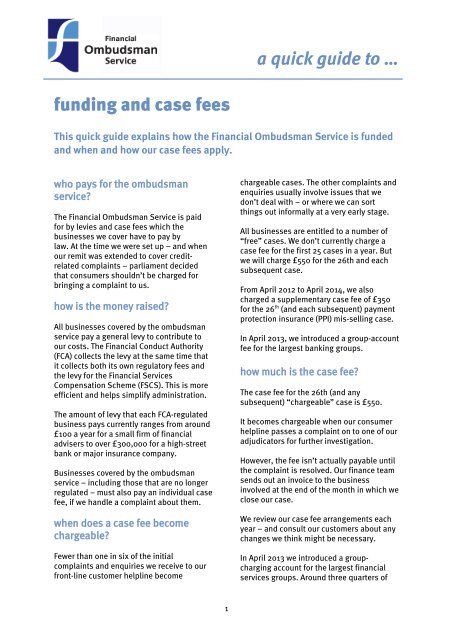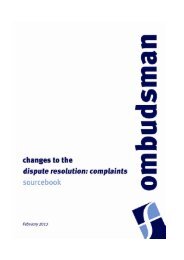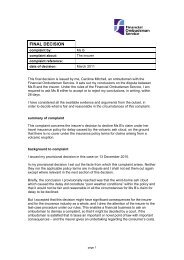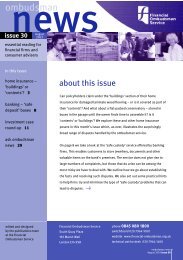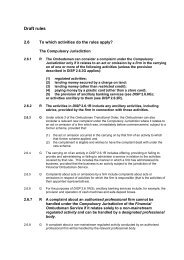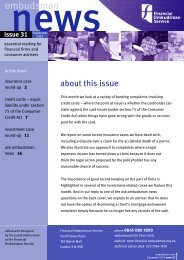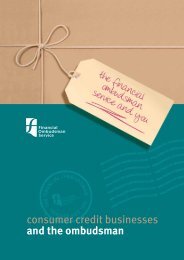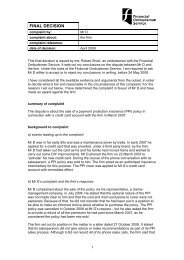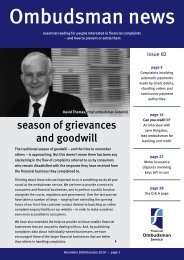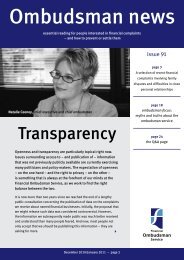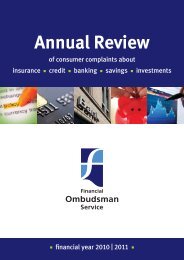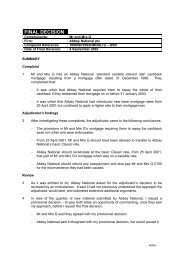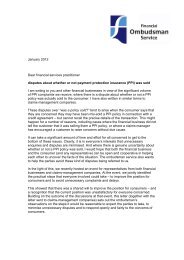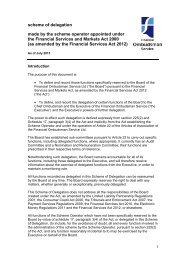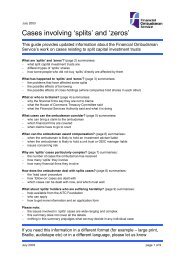funding and case fees - Financial Ombudsman Service
funding and case fees - Financial Ombudsman Service
funding and case fees - Financial Ombudsman Service
Create successful ePaper yourself
Turn your PDF publications into a flip-book with our unique Google optimized e-Paper software.
a quick guide to …<strong>funding</strong> <strong>and</strong> <strong>case</strong> <strong>fees</strong>This quick guide explains how the <strong>Financial</strong> <strong>Ombudsman</strong> <strong>Service</strong> is funded<strong>and</strong> when <strong>and</strong> how our <strong>case</strong> <strong>fees</strong> apply.who pays for the ombudsmanservice?The <strong>Financial</strong> <strong>Ombudsman</strong> <strong>Service</strong> is paidfor by levies <strong>and</strong> <strong>case</strong> <strong>fees</strong> which thebusinesses we cover have to pay bylaw. At the time we were set up – <strong>and</strong> whenour remit was extended to cover creditrelatedcomplaints – parliament decidedthat consumers shouldn’t be charged forbringing a complaint to us.how is the money raised?All businesses covered by the ombudsmanservice pay a general levy to contribute toour costs. The <strong>Financial</strong> Conduct Authority(FCA) collects the levy at the same time thatit collects both its own regulatory <strong>fees</strong> <strong>and</strong>the levy for the <strong>Financial</strong> <strong>Service</strong>sCompensation Scheme (FSCS). This is moreefficient <strong>and</strong> helps simplify administration.The amount of levy that each FCA-regulatedbusiness pays currently ranges from around£100 a year for a small firm of financialadvisers to over £300,000 for a high-streetbank or major insurance company.Businesses covered by the ombudsmanservice – including those that are no longerregulated – must also pay an individual <strong>case</strong>fee, if we h<strong>and</strong>le a complaint about them.when does a <strong>case</strong> fee becomechargeable?Fewer than one in six of the initialcomplaints <strong>and</strong> enquiries we receive to ourfront-line customer helpline becomechargeable <strong>case</strong>s. The other complaints <strong>and</strong>enquiries usually involve issues that wedon’t deal with – or where we can sortthings out informally at a very early stage.All businesses are entitled to a number of“free” <strong>case</strong>s. We don’t currently charge a<strong>case</strong> fee for the first 25 <strong>case</strong>s in a year. Butwe will charge £550 for the 26th <strong>and</strong> eachsubsequent <strong>case</strong>.From April 2012 to April 2014, we alsocharged a supplementary <strong>case</strong> fee of £350for the 26 th (<strong>and</strong> each subsequent) paymentprotection insurance (PPI) mis-selling <strong>case</strong>.In April 2013, we introduced a group-accountfee for the largest banking groups.how much is the <strong>case</strong> fee?The <strong>case</strong> fee for the 26th (<strong>and</strong> anysubsequent) “chargeable” <strong>case</strong> is £550.It becomes chargeable when our consumerhelpline passes a complaint on to one of ouradjudicators for further investigation.However, the fee isn’t actually payable untilthe complaint is resolved. Our finance teamsends out an invoice to the businessinvolved at the end of the month in which weclose our <strong>case</strong>.We review our <strong>case</strong> fee arrangements eachyear – <strong>and</strong> consult our customers about anychanges we think might be necessary.In April 2013 we introduced a groupchargingaccount for the largest financialservices groups. Around three quarters of1
our workload is now paid for on this morefinancially stable basis – by the businesseswhose customers use us most.how are “non-chargeable” <strong>case</strong>sallocated for IFA-networks?Each IFA network is entitled to 25 “free”<strong>case</strong>s a year – however many members ithas.This is because we cover all single regulatedfirms authorised by the FCA – <strong>and</strong> a networkis technically a single regulated firm.why should the business paya <strong>case</strong> fee if the complaintisn’t upheld?Our rules (set out in the FCA H<strong>and</strong>book) saythat if we consider a complaint against abusiness, the <strong>case</strong> becomes chargeablewhatever the outcome.In fact, less than 1% of businesseswe cover pay <strong>case</strong> <strong>fees</strong>. For businesses thathave 26 or more complaints a year referredto the ombudsman service, the cost involved– £550 per <strong>case</strong>, after the 25th complaint –is likely to be much less than the legal coststhat might otherwise be involved indefending a claim in court, where thepublicity could be far more damaging to thebusiness’s bottom line.does a business pay a <strong>case</strong> fee ifthe complaint is “dismissed”?When we receive a completed complaintform from a consumer, our front-lineadvisers check the form <strong>and</strong> the finalresponse letter that the business shouldhave sent the consumer.From looking at these, we may decide thatthe complaint isn’t something we woulddeal with or that it should be “dismissedwithout consideration of its merits” underour rules.A complaint doesn’t become a chargeable<strong>case</strong> if we dismiss it at this initial stage.So businesses should set out their positionas clearly as possible in their final response– <strong>and</strong> attach the relevant evidence – to helpus establish the facts early on.Sometimes it may not be apparent at thisstage that the complaint should bedismissed. The facts may be unclear or indispute, meaning we need to look into theissues in more detail.In these circumstances, a <strong>case</strong> fee becomeschargeable – even if we later decide that thecomplaint should be dismissed.the <strong>case</strong> was outside theombudsman’s jurisdiction – doesthis mean there is no <strong>case</strong> fee?It may not always be a straightforwardmatter to determine whether a complaint iscovered by the ombudsman service.“Jurisdiction” disputes can involve complexarguments, <strong>and</strong> we will need to take accountof – <strong>and</strong> investigate – all the facts <strong>and</strong> legalpoints that either side might raise.Where it is not apparent – from thecomplaint form <strong>and</strong> the final response letterfrom the business to the consumer –whether or not we can take on a complaint,a <strong>case</strong> fee will become chargeable – even ifwe later decide, after more investigation,that the complaint is outside ourjurisdiction.why don’t consumers have topay for taking a <strong>case</strong> tothe ombudsman?The legislation that gives the <strong>Financial</strong><strong>Ombudsman</strong> <strong>Service</strong> its powers – the<strong>Financial</strong> <strong>Service</strong>s <strong>and</strong> Markets Act 2000(as amended) – doesn’t contain any powerto charge consumers for using our service.Parliament decided that the ombudsmanshould be funded by the businesses that wecover <strong>and</strong> that these businesses – notconsumers – should meet the costs ofresolving disputes.2
can a business recover its costsfrom the consumer?No. A business can’t claim back costs from aconsumer who has complained to theombudsman service – or suggest that itmight do so. Consumers have a statutoryright to refer disputes to us, free of charge,if they are unhappy with the way a businesshas dealt with a complaint.If a business threatens to penalise aconsumer for exercising their statutory rightto refer a complaint to us, this may haveregulatory consequences for the business.www.financial-ombudsman.org.ukvisit our website for:• news <strong>and</strong> frequently-asked questions• information <strong>and</strong> updates• technical guidance for businesses <strong>and</strong> help for consumers• ombudsman news – our regular newsletter with <strong>case</strong> studies, features <strong>and</strong> commentary.This quick guide gives general information only <strong>and</strong> is correct at the time it was published.It is not a definitive statement of the law, our approach or our procedure.© <strong>Financial</strong> <strong>Ombudsman</strong> <strong>Service</strong> Ltd, April 20143


